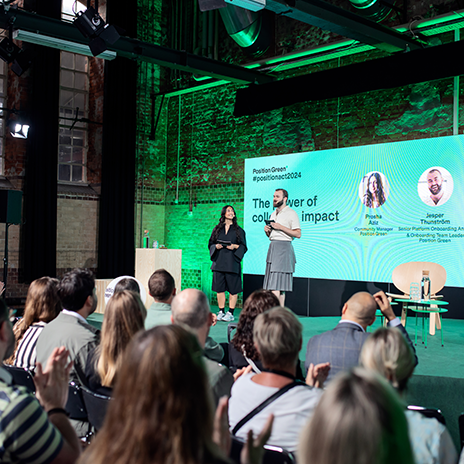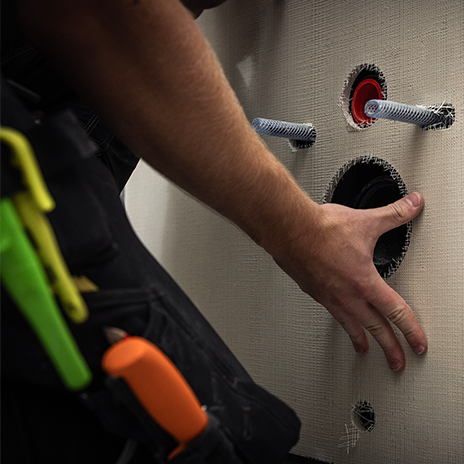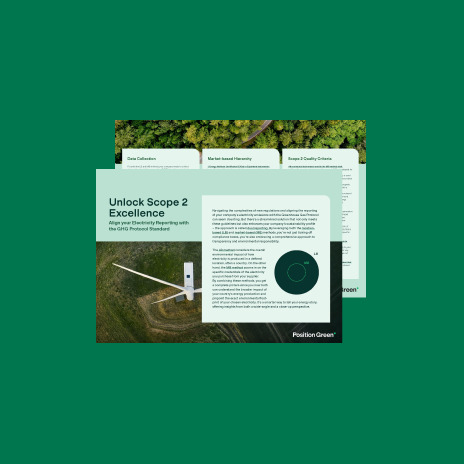Minimizing environmental impact in the construction industry with Circura

What was the starting point of your sustainability work?
Fredrik: Sustainability has been a part of our DNA from the get-go. Circura was founded with a clear focus on maintaining, refurbishing, and remodeling buildings, which aligns clearly with current sustainability trends and needs.
For instance, if we look at the circular economy value proposition within the building industry, one of the key aspects is to retain as much of the material value of concrete, steel, aluminum, and plastic in the existing building structures, called “embodied emissions”.
Building material corresponds to around 20% of global greenhouse gas emissions and by extending the lifespan of buildings, we can reduce the negative impact related to resource scarcity and climate change.
What key sustainability needs have you identified?
Fredrik: Many aging buildings have not been properly maintained and now need to be refurbished or possibly even demolished. One of our goals is to extend the technical lifespan of buildings, and in order to achieve that we need to invest much more in maintenance going forward. We need to keep our buildings in good condition and maintain them regularly, which is where Circura comes in.
How are you preparing for CSRD/ESRS reporting?
Viktor: The first thing we did when it came to reporting was to look at how we gather and manage data. We ended up looking at several different systems to see how they could assist us from a compliance and operations perspective. That’s where Position Green entered the picture. We especially valued the ability to create our own measuring points, which is one of the reasons why we chose Position Green.

“”Flexibility is the number one reason we wanted to work with Position Green””
Fredrik Blomqvist – Head of Accounting
Viktor Andersson – Group Business Controller
What opportunities do you see from the CRSD/ESRS reporting?
Viktor: Utilizing the CSRD/ESRS as a part of implementing our sustainability strategy allows us to reduce operational, reputational, and compliance risks. We acquire many small companies around Sweden that may not have a formalized sustainability data structure, so by incentivizing them to follow this initiative, we reduce risk within our company.
Fredrik: It also helps us drive and motivate sustainability changes and performance, consequently raising the bar for all our companies with the ultimate goal of value creation. We are already seeing increased demand from our customers for ways of working that will lessen the environmental impact of remodeling and maintenance.
Viktor: There’s also a social dimension involved since the construction industry has a reputation for including companies with questionable practices. Certain subcontractors have relatively poor working conditions, and the reporting allows us to monitor performance, which is necessary in order to set a higher standard. We’re providing our subsidiaries with the tools and processes to evaluate the ESG responsibility of their subcontractors.
How does Circura attempt to combat ESG industry challenges?
Fredrik: Health and safety, working conditions, and fair pay are major challenges within our industry due to the existence of unethical actors. We have many foreign employees of subcontractors from other EU countries whom we need to ensure are being fairly compensated and provided a safe workplace. Additionally, we need to ensure our subcontractors are compliant with safety- and environmental regulations as they are fundamental to the way we do business.
Viktor: Another common industry challenge is materials. We source our materials from all over the world, and it’s challenging to keep track of the entire supply chain as the currently available information is scarce. In the coming years, Circura will develop a sustainable supply chain management system to establish a solid baseline for all of our companies and guide them on how to gather data, monitor performance, and follow up on potential non-conformities with our suppliers.
What are the long-term results of your ESG efforts?
Fredrik: For us at Circura, building an agile structure for our sustainability efforts offers long-term benefits. Flexibility, being able to adjust measurement points as needed and the ability to implement changes fast were the primary reasons we chose to collaborate with Position Green. The next step is to integrate Position Green’s software with our other systems so we can have more real-time data.
What are your long-term ESG ambitions?
Viktor: Our ultimate goal is that when you think about Circura, you think about a company that helps asset owners maintain and enhance their property holdings in an environmentally conscious way. We will continue to provide our employees with training on new technologies and materials, emphasizing the benefits of these innovations over traditional methods.
Given that construction is a highly traditional industry, implementing change happens gradually. However, even minor adjustments can yield significant long-term benefits.
About Circura
Circura is a Nordic group of companies specializing in building and infrastructure renovation, construction services, and insurance damages. The group was founded on strong sustainability values and has a vision of renewing history while preserving the future.
Their primary focus is on extending the life of existing structures, and renewing and transforming buildings rather than demolition and new construction. Circura is committed to achieving sustainable outcomes by collaborating with local contractors and fostering innovation within the traditional construction sector.
Circura uses Position Green’s software to streamline ESG efforts and prepare for CSRD/ESRS reporting.
You can read more about Circura’s sustainability work here.
Stay up to date with the latest ESG-trends with our newsletter
The post Minimizing environmental impact in the construction industry with Circura appeared first on Position Green.


